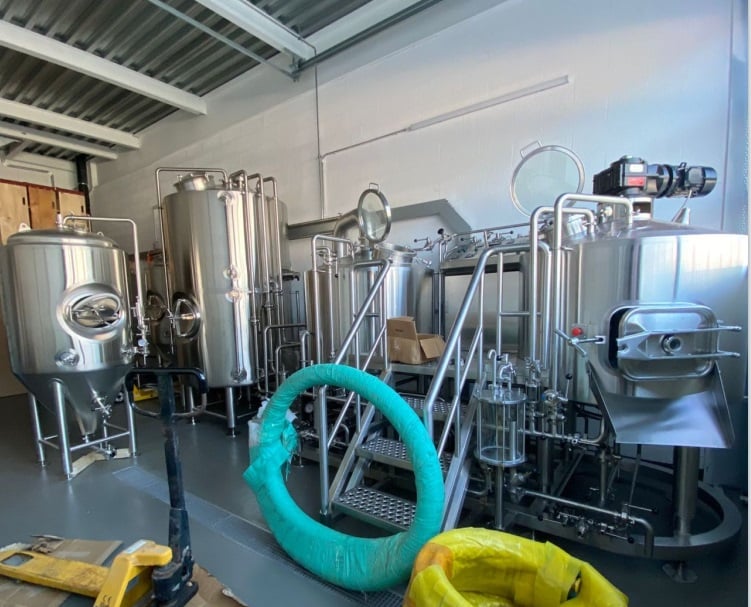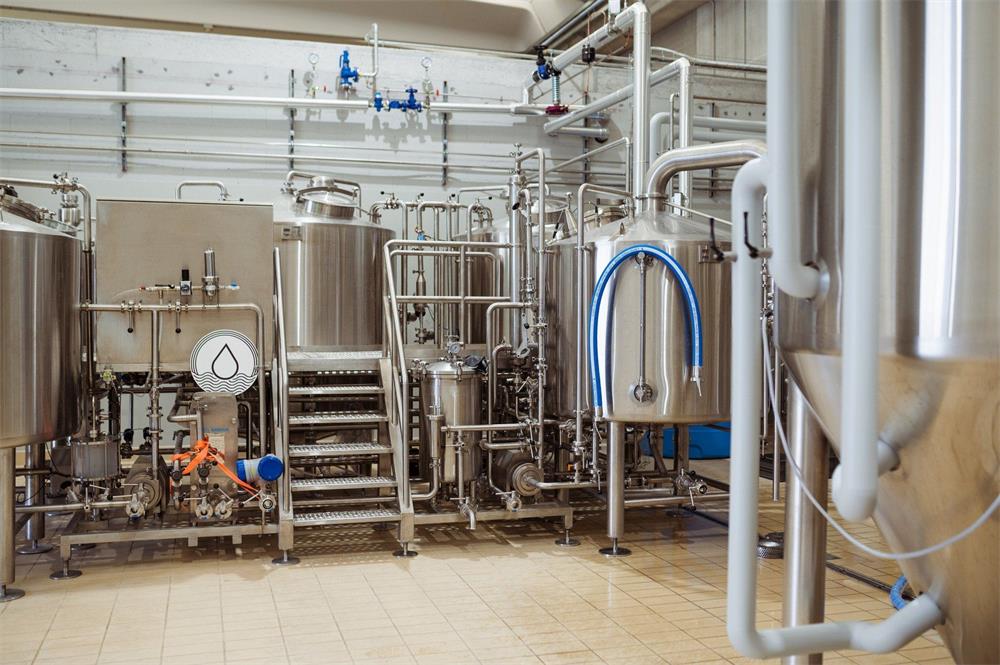The Ultimate Guide to a 5 BBL Brewhouse
If you’re diving into the world of craft brewing, you might have come across the term 5 BBL brewhouse. So, what exactly is it? A 5 BBL (barrel) brewhouse is essentially a brewing system designed to produce 5 barrels of beer per batch. For context, one BBL equals 31 gallons, meaning that with a 5 BBL system, you’re producing around 155 gallons of delicious beer every time you brew.
But that’s just the beginning! In this comprehensive guide, we’ll break down everything from how a 5 BBL brewhouse works, the equipment you’ll need, the brewing process, customization options, price ranges, and even how to choose the right supplier. Whether you’re planning to open your own craft brewery or just curious, this guide will help you get a clear understanding of what to expect.
Overview of a 5 BBL Brewhouse
A 5 BBL brewhouse is the sweet spot for small-to-medium-scale breweries. It offers a balance between production efficiency and space utilization. You’re not quite at an industrial scale, but you’re producing enough to supply a bustling taproom or distribute locally.
The 5 BBL brewhouse includes essential brewing equipment like the mash tun, lauter tun, kettle, and whirlpool, all integrated into a compact system. The equipment is usually made of stainless steel for durability and hygiene, with automation options available depending on your needs. This system is popular among microbreweries due to its scalable production volume and relatively manageable operational costs.

Equipment Guide for a 5 BBL Brewhouse
When setting up a 5 BBL brewhouse, you’ll need several key pieces of equipment. Here’s a breakdown of the primary components that make up the brewhouse.
| Equipment | Description | Purpose |
|---|---|---|
| Mash Tun | A vessel where grains and water are mixed and heated to convert starches into fermentable sugars. | Essential for creating the wort (unfermented beer). |
| Lauter Tun | Used to separate the solid grain husks from the liquid wort after the mashing process. | Clarifies the wort by straining out solids. |
| Brew Kettle | A large kettle where the wort is boiled with hops. | Sterilizes the wort and allows for flavor extraction. |
| Whirlpool | A vessel used to separate hop particles and trub (sediment) from the wort after the boiling process. | Ensures a clear wort by settling out unwanted particles. |
| Fermentation Tanks | Closed tanks where the wort is fermented into beer by yeast. | Vital for the fermentation process where sugar becomes alcohol. |
| Heat Exchanger | Transfers heat out of the wort post-boil, cooling it to a temperature suitable for fermentation. | Cools the wort quickly and efficiently. |
| Pumps and Piping | Facilitates the movement of liquid between vessels. | Necessary for transferring wort between different stages. |
| Control Panel | Provides automated control over the brewing process, including temperature, timing, and flow rates. | Simplifies operations and enhances consistency. |
The Brewing Process in a 5 BBL Brewhouse
Brewing with a 5 BBL brewhouse follows a standard process, but with the ability to produce larger quantities compared to smaller homebrew systems. Here’s a simplified version of the brewing process using a 5 BBL brewhouse:
1. Mashing
The process starts in the mash tun, where crushed malted barley is mixed with hot water. This activates enzymes in the malt, converting starches into sugars. This sugar-rich liquid, known as wort, is the base of your beer.
2. Lautering
Next, the mash is transferred to the lauter tun, where the grain husks are separated from the liquid wort. This step is crucial to ensure the wort is as clear as possible before boiling.
3. Boiling
The wort is then transferred to the brew kettle, where it is boiled. Hops are added during this stage to impart bitterness, aroma, and flavor to the beer. Boiling also sterilizes the wort, eliminating unwanted bacteria and enzymes.
4. Whirlpool
Once the boil is complete, the wort is moved to the whirlpool, where it is spun at high speed to separate the hop residues and sediment. This ensures a clean and clear wort, ready for fermentation.
5. Cooling and Fermentation
The wort is cooled using a heat exchanger, then transferred to fermentation tanks. Yeast is added at this stage, and fermentation begins. Depending on the type of beer, this process can take anywhere from a few days to several weeks.
Customization Options for 5 BBL Brewhouse
When it comes to a 5 BBL brewhouse, customization is key. Here’s a look at some of the customization options you might want to consider:
| Factor | Options | Details |
|---|---|---|
| Capacity | Although the standard is 5 BBL, brewers can opt for slightly larger systems with extended tanks to increase batch size. | Consider if you plan to scale production in the future. |
| Space Requirements | A typical 5 BBL system requires around 300–500 square feet of floor space. | Ensure your brewery space can accommodate the equipment and allows room for expansion. |
| Design and Layout | You can choose between manual, semi-automated, or fully automated systems. | Automated systems are easier to manage, but manual systems provide more hands-on control. |
| Heating Options | Steam, direct fire, or electric heating systems are common choices. | Steam heating offers better temperature control but is more expensive to set up. |
| Material | Stainless steel is the go-to material, but copper options are also available for aesthetic reasons. | Stainless steel is more durable and easier to clean, while copper gives a traditional look. |
Suppliers and Price Range for a 5 BBL Brewhouse
Finding the right supplier is crucial to getting the best equipment and service. Here’s a breakdown of popular suppliers, along with the price range for a 5 BBL brewhouse.
| Supplier | Price Range | Location | Notes |
|---|---|---|---|
| Ss Brewtech | $35,000 – $60,000 | USA | Known for high-quality stainless steel equipment with advanced controls. |
| Alpha Brewing Operations | $40,000 – $65,000 | USA | Offers customizable brewhouses with various automation options. |
| Psycho Brew | $30,000 – $50,000 | USA | Focuses on smaller, affordable brewhouses perfect for microbreweries. |
| Specific Mechanical Systems | $50,000 – $75,000 | Canada | Premium systems known for durability and performance. |
| Tiantai Brewing Equipment | $25,000 – $45,000 | China | Offers cost-effective systems with flexible customization options. |
Installation, Operation, and Maintenance of a 5 BBL Brewhouse
Operating a 5 BBL brewhouse involves several steps, from installation to day-to-day operation and ongoing maintenance. Here’s what you need to keep in mind.
| Step | Details |
|---|---|
| Installation | Brewhouse installation should be handled by professionals to ensure all piping, electrical, and mechanical components are set up correctly. |
| Operation | Most 5 BBL brewhouses offer some level of automation, but you’ll still need trained staff to monitor temperatures, flow rates, and other variables. |
| Maintenance | Regular cleaning is essential to prevent contamination. This includes cleaning-in-place (CIP) systems for tanks and manual cleaning of smaller components. |
| Downtime Management | Establish a routine for servicing and equipment checks to prevent unexpected downtimes that can delay production. |
How to Choose the Right Supplier for Your 5 BBL Brewhouse
Choosing the right supplier is crucial to your brewery’s success. Here’s a guide on what to look for when picking a brewhouse supplier:
| Factor | Details |
|---|---|
| Reputation | Look for suppliers with positive reviews and a track record of delivering high-quality equipment on time. |
| Customization Options | Ensure the supplier offers the flexibility to customize the brewhouse to your specific brewing needs. |
| After-Sales Support | A good supplier should offer comprehensive after-sales support, including installation guidance and maintenance services. |
| Warranty | Check for warranties on key components to avoid costly repairs down the road. |
| Price and Value | While budget is important, consider the long-term value in terms of durability and performance, rather than just going for the cheapest option. |
Advantages and Limitations of a 5 BBL Brewhouse
While a 5 BBL brewhouse is an excellent choice for many brewers, it’s important to consider both the advantages and the limitations.
| Advantages | Limitations |
|---|---|
| Scalable Production | The 5 BBL size allows for increased production without committing to a massive, costly system. |
| Manageable Space Requirements | Fits in smaller spaces, making it ideal for brewpubs and microbreweries. |
| Flexibility in Brewing Styles | With multiple vessels, you can brew different styles and experiment with batches more easily. |
| Automation Options | Semi-automated and fully automated options allow for precise control over the brewing process. |
| Higher Initial Cost | The upfront investment can be substantial, especially with customizations and automation. |
| Requires Skilled Operators | Though automated, you still need trained staff to operate and maintain the system efficiently. |

FAQs
| Question | Answer |
|---|---|
| What is a 5 BBL brewhouse? | A brewing system that produces 5 barrels (155 gallons) of beer per batch, typically used by small to medium-sized breweries. |
| How much space do I need for a 5 BBL brewhouse? | You’ll need between 300–500 square feet of space for the brewhouse, depending on the layout and design of the system. |
| What’s the cost of a 5 BBL brewhouse? | The price ranges from $25,000 to $75,000, depending on the supplier, customizations, and automation options. |
| How long does it take to brew with a 5 BBL system? | It typically takes about 6–8 hours for a single brew day, not including fermentation time, which can vary based on the beer style. |
| Can I expand a 5 BBL system? | Yes, many systems are designed to be scalable, so you can add more tanks or larger fermenters as your brewery grows. |
Share this entry
Interested in learning more about Brewing Systems including additional details and pricing information? Please use the form below to contact us!
YOLONG BREWERY EQUIPMENT FAQS
- Commercial Brewery / Craft Brewery / Microbrewery / Nanobrewery
- What is The Difference Between Craft Beer and Industrial Beer?
- The Bespoke Differences In Custom Brewing Systems
- Everything You Need to Know About Kettle Souring
- How to Choose Brewing Equipment for Your business?
- How To Choose The-Best Partner To Build Your Commercial Microbrewing System?
- Two Detection Sensors That You Need To Use In Your Brewhouse System
- Remote Control Applications in Brewing Equipment/How does it work?
- How To Clean Your Brand New Brewery Tanks?

